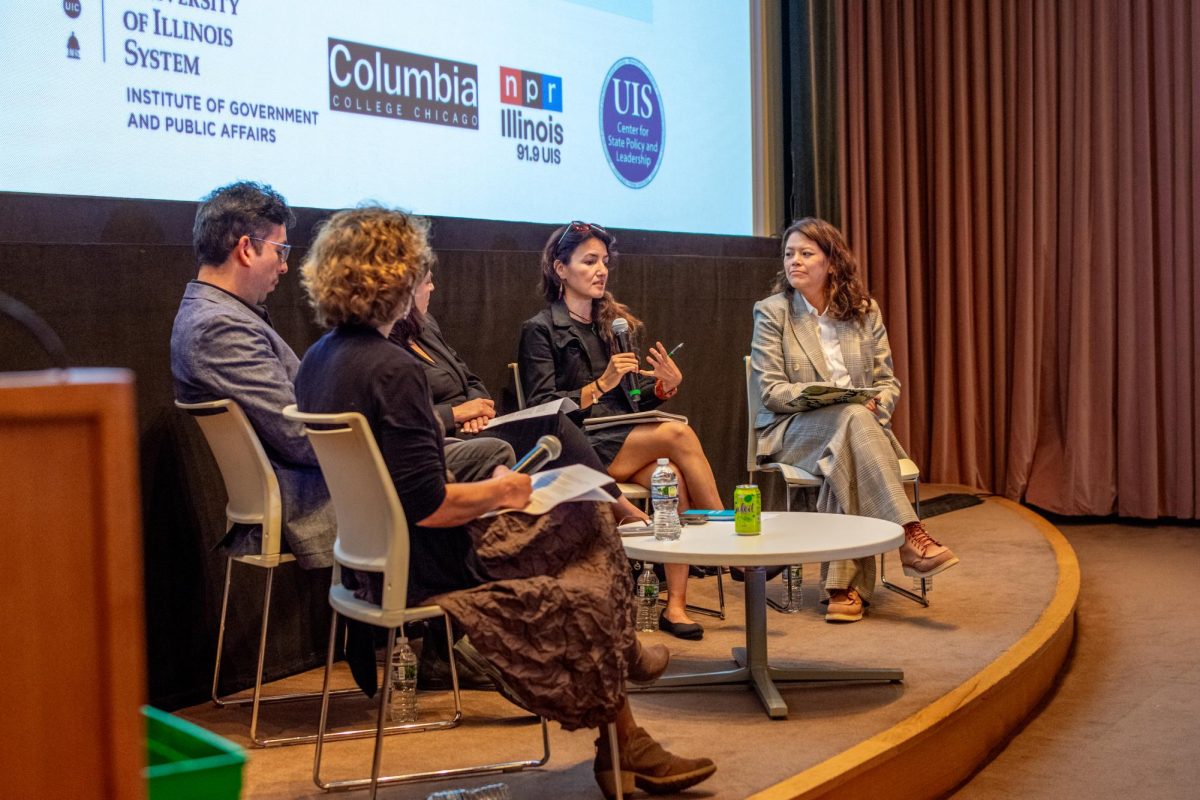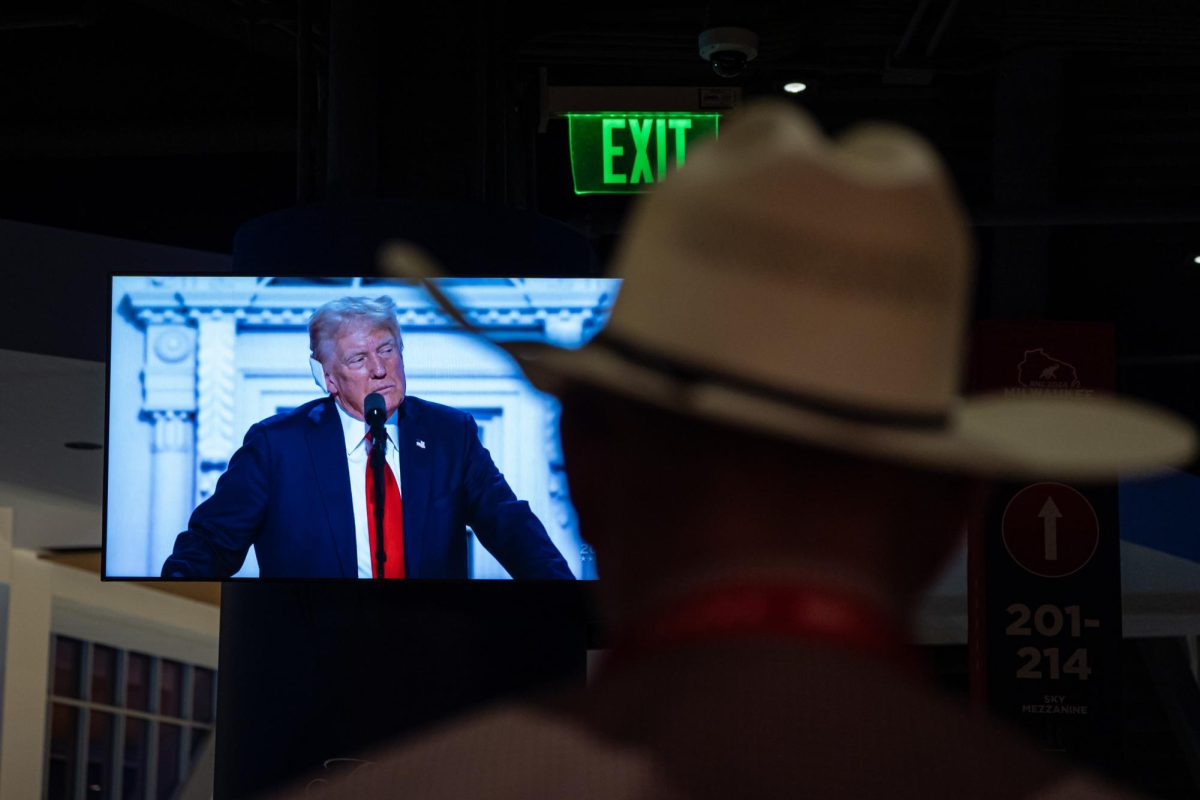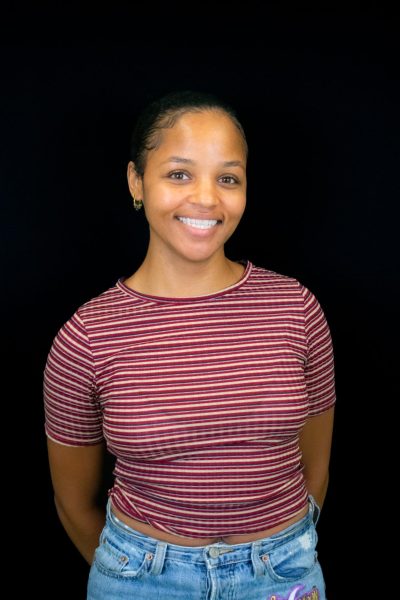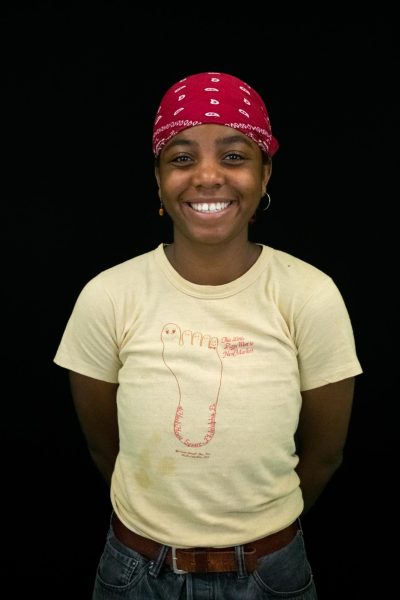On Thursday, October 3, more than 20 people gathered in the 1104 S. Wabash Ave. building for the final event of “Undebates: A Three-Part Public Discussion Series on Hot Topics in the Presidential Election.
Open to the public, the event kicked off at 6 p.m. and was moderated by Sharon Bloyd-Peshkin, a professor in the School of Communication and Culture and the creator of Columbia Votes.
It was the third in a series of discussions that gathered journalists and scholars to examine key issues, such as foreign policy, reproductive health and immigration during the 2024 election. The final panel focused on immigration debates and how the presidential candidates will address the issue.
This series was a collaborative effort between the University of Illinois Chicago’s Institute of Government and Public Affairs, NPR Illinois, Illinois Public Media, Columbia College Chicago, the Chicago Sun-Times and the University of Illinois Springfield’s Center for State Policy and Leadership.
The public discussion series formed from an idea at the 2023 Democracy and Polarization Summit on Oct. 9 and 10 held at the Abraham Lincoln Presidential Library and Museum in Springfield.
Alyssa Cooper, senior coordinator at the Institute of Government and Public Affairs at the University of Illinois, said participants wanted to combine resources and publicly discussed “hot topics related to the election that politicians and the public are pretty adamant about.” Collaboratively they researched main themes across major polls and decided to focus on foreign policy, reproductive health and immigration.
Each discussion from the series will be a part of NPR Illinois programming and run across all state stations, Cooper said.
Each event featured two segments: a small discussion and a main panel, both facilitated by the moderator. A pre-event survey was given to guests with questions about the importance of immigration and voting. Attendees were welcomed to food and able to interact with the experts and ask questions during the main panel discussion.
Prior to the event, Bloyd-Peshkin conducted research on the positions of major party candidates and public sentiment regarding immigration, including both newcomers to the country and current residents to form her questions for the panelists. She said she hopes her questions will foster thoughtful conversation for audience members too.
“I’m hoping that they will come away with a more nuanced understanding based on what they learn from these panelists about the issues involved in immigration,” Bloyd-Peshkin said.
During the main panel, panelists defined immigration, discussed technical terms and explored how other countries handle the issue over the span of three discussion questions. They shared personal insights, historical context and statistics, focusing on border security challenges, economic restrictions and affordable programming.
“My main focus is precarious work among low wage immigrant workers,” said University of Illinois Chicago associate professor Xóchitl Bada. “I work a lot on issues and the ways that immigrants have been able to organize to enforce labor rights standards for undocumented workers in this country.”
The time it takes to process immigration forms depends on the type of application, agency involved, location, specific categories and premium processing.
Panelists also reflected on the treatment of international immigration across the U.S., specifically how the influx of Ukrainian and Latino immigrants were managed by Chicago communities and local governments.
“We welcomed Ukrainians with far more developed programs for them to stay, humanitarian programs that allowed them to stay and work quickly. Whereas in other groups, we saw that there were longer delays,” said Michelle Jacobson, chair of the American Bar Association’s Commission on Immigration.
Grazyna Zajaczkowska, the director of immigration services at the Polish American Association, said the discrepancy between how immigrants are treated was clear to her. Her organization has been able to help Ukrainian immigrants by providing resources towards health care, college and therapy.
“There are Cubans who have been here in the same status for 30 years and other Haitans for many, many years. The system doesn’t work and it needs to be changed,” said Zajaczkowska, who attended the event.
Panelist WBEZ Chicago Immigration reporter Adriana Cardona-Maguigad further illustrated this difference through her own experience as a reporter. She said while she has witnessed many residents remain welcoming towards migrants, she also has seen the impact of the city’s pace to open up shelters and develop infrastructure.
“Immigration itself creates a level of emotion and creates fears of strangers coming in to take what you have been fighting for. I’ve seen a lot of frustrations among some residents,” Cardona-Maguigad said.
When asked about the political rhetoric surrounding the current election, panelists emphasized the fears and anxieties within immigration communities, addressing the troubling spread of misinformation and its role in intensifying tensions among various groups.
“I think immigration can stir up deep-seated emotions.” René D. Flores, an associate professor at The University of Chicago said, “The problem is when these emotions get exploited for political gain by political entrepreneurs.”
Flores discussed how fears are being utilized by Vice President Kamala Harris and former President Donald Trump in the 2024 election. He noted that Trump seeks to energize his supporters with an anti-immigrant stance as Harris aims to appeal to center political views on immigration while focusing on issues like education, housing and healthcare. This context is underscored by a recent Gallup study revealing that nearly 55% of Americans support reducing immigration to the U.S., indicating a shift in public sentiment as highlighted by Flores.
Following the conversation, several attendees expressed gratitude towards the panel for sharing relatable stories and expert opinions on immigration themes and policy.
“What was really interesting was listening to the panelists and hearing about a lot of things that the government is doing well,” said Tyler Harding, a senior film and television major. “There are real effects that affect people’s lives, affect policy and public opinion about immigrants and that threatens their lives and their livelihoods, and their humanity.”
Aparna Ramakrishnan, junior public policy major from the University of Illinois Chicago, said there’s a lot more to learn about immigration.
“One of the biggest things I realized is how subjective immigration is, and how we all have different views of who we think of when we say immigrant or migrant of undocumented immigrant,” Ramakrishnan said.
Copy edited by Trinity Balboa











